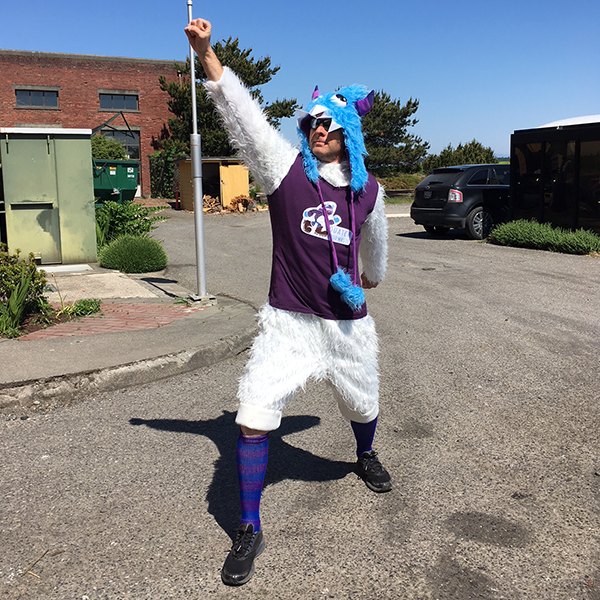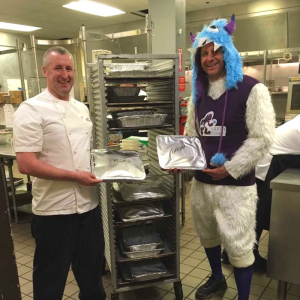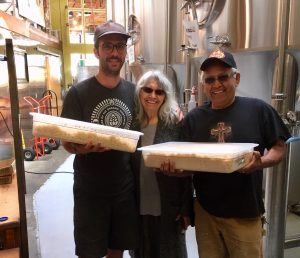
By Mark Peterson
“Wow.” Yes, that is what I said to myself as I have started to reflect a bit more intently on the occurrences of 2018. The turn of the seasons and the holidays ahead provide me an annual opportunity to take stock of the past 12 months and be thankful and enjoy the gift of another day here on this blue planet.
2018 has been one rip-rocking year for me here at Sustainable Connections, for the organization in general, and I’m sure glad that I have been surfing this wave of goodness with such wonderful co-workers. It has been a good year to be at Sustainable Connections and so many things were accomplished across all our program areas. It is a motivating work environment to see the difference being made in our community, from energy efficiency to neighborhood international markets, and local food systems to hunger relief, the results are impressive.
 Personally, it has been a particularly rewarding year in regards to our Toward Zero Waste program, but that is not to say there weren’t a few bumps along the way. 2018 began with the major challenge of the incredible disruption of the world recycling markets as a result of the new import bans instituted by China. The full effects of this worldwide shift are yet to be seen, and some of those negative effects are finally starting to impact Whatcom County.
Personally, it has been a particularly rewarding year in regards to our Toward Zero Waste program, but that is not to say there weren’t a few bumps along the way. 2018 began with the major challenge of the incredible disruption of the world recycling markets as a result of the new import bans instituted by China. The full effects of this worldwide shift are yet to be seen, and some of those negative effects are finally starting to impact Whatcom County.
It was these worldwide forces impacting us here locally that shifted my Toward Zero Waste thinking yet again. Waste happens locally, both on an individual and community scale. We just don’t really think of it that way
, but there is no denying that waste starts at home and work since waste is a byproduct of what we consume. Like many other communities in the world, we no longer have a local landfill; the ultimate resting place for the waste we create is elsewhere–somebody else’s backyard. Recycling is no longer the free or the easy option, and it’s human nature to seek the path of least resistance, which means more tons of our waste is ending up in landfills.
By now you may be wondering ‘where’s the rewarding part of this story?’. The unlikely answer lies in the 40% of the food we produce that goes uneaten and is destined for landfills. Why is this rewarding? Because there are options for us to handle this waste locally in ways that also benefit our community. We hold the keys to successful reduction because how we handle food and organic waste in Whatcom County is not dictated by tariffs in China, the market p rice for plastic, or (for the most part) even federal policy.
rice for plastic, or (for the most part) even federal policy.
The holy grail of the Toward Zero Waste movement is waste reduction, and this is where the rewarding part comes in to play. Food Recovery is just that–waste reduction–because food that is produced and eaten is not wasted. It has been inspiring to see the support for our fledgling Food Recovery Initiative and the commitment of everyone involved, including the Whatcom County Health Department, volunteers, chefs, business owners, and the agencies distributing the food. The initiative has excelled so much thanks to the collaborative effort.
For me, there are many sides to food recovery, and while we have achieved some amazing results this year, we’ve also just scratched the surface. On a purely waste reduction level, preventing organic matter, including food, from ending up in landfills is a success. On a human level, I now have a better understanding of food insecurity in our community and the positive role our Food Recovery Initiative has played so far. Over 25,000 lbs. of food recovered and diverted from landfill resulting in over 15,000 meals served is real impact and something we can be proud of. But at the end of this year, I see that this is merely the beginning, and even more work and bigger success is yet to come. Yes–we’re going big in 2019!
Click here to learn how you can get involved in the Food Recovery Initiative.
